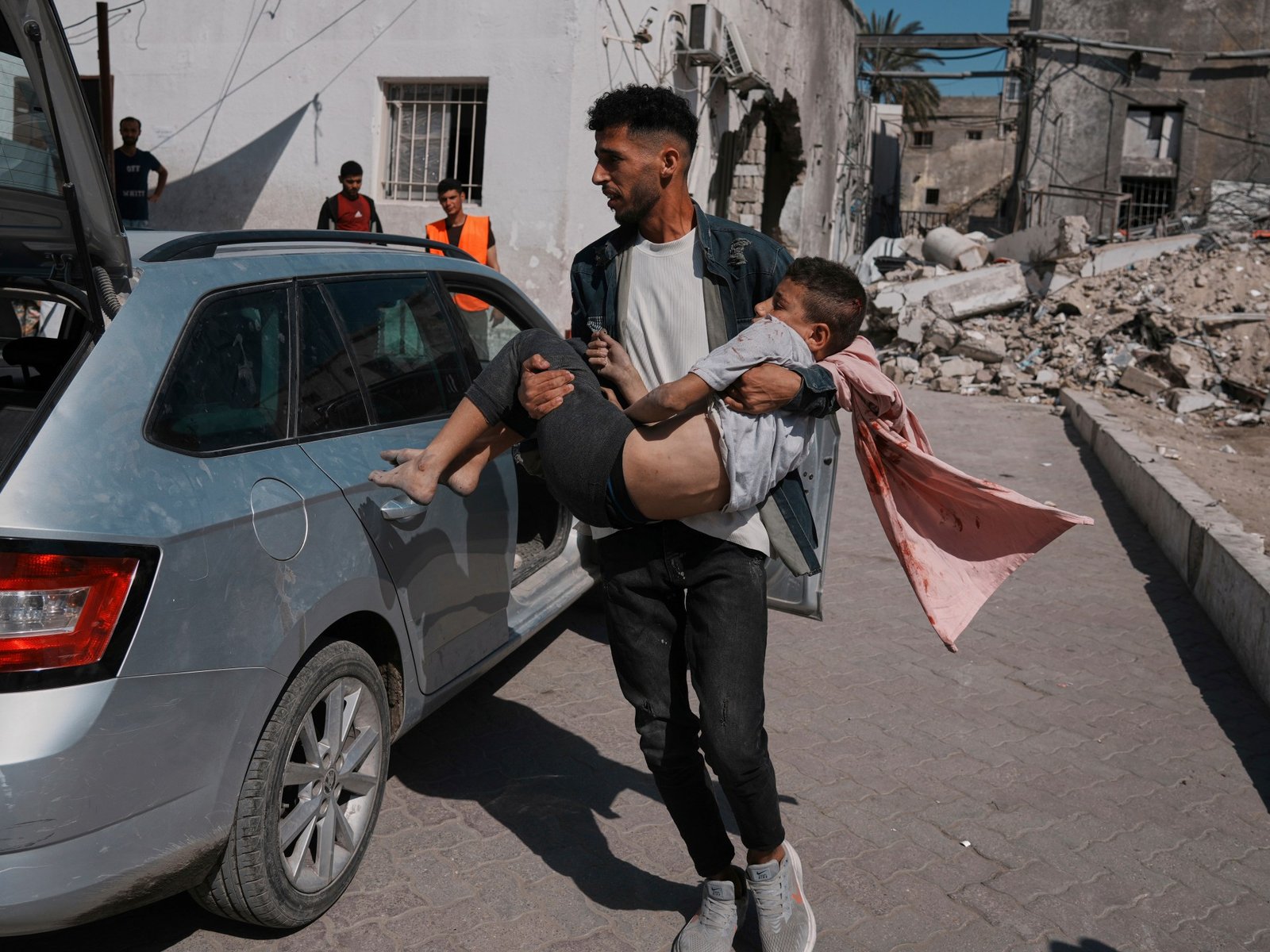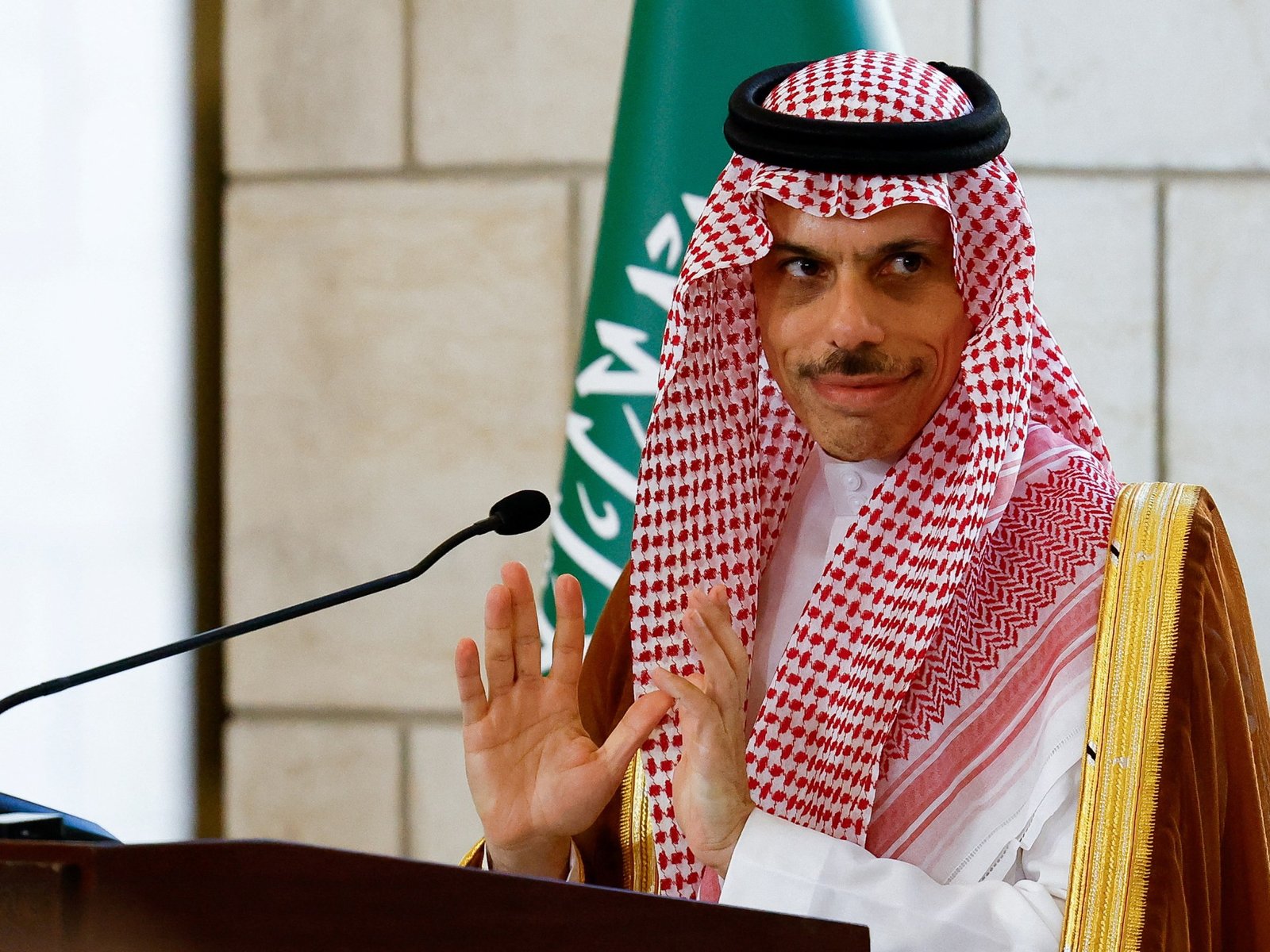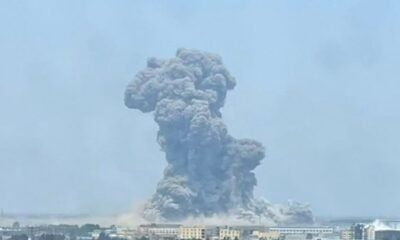Middle East
‘Discordant’: How Trump’s attacks on the Houthis split his Republican base | Donald Trump News

Divisions on the right between those who believe in a global system backed by US military power and others who see that system as a drain on US resources are not new. That schism has persisted for decades.
The latter group, which has often included ultra-nativist and racist figures, was pushed further to the fringes after the attacks on the US on September 11, 2001.
The US responded to those attacks by launching a global “war on terror”, with conservatives strongly backing US interventions in countries like Iraq and Afghanistan.
But those wars came to be seen as bloody and prolonged failures, as the public started to become more sceptical of US involvement abroad.
“Young people in particular who witnessed these disastrous wars are not sold on the benefits of this global US security architecture or the ideology that leads to interventions abroad,” Mills said.
Since first taking office in 2017, Trump has mostly continued the routine use of US military force overseas, overseeing drone strikes across the Middle East and Africa and assassinating Iranian General Qassem Soleimani during his first term in office.
During his second term, he has openly mused about using military force to seize control of the Panama Canal and Greenland.

But experts said he has also grasped the political benefits of pitching himself as an anti-war candidate and critic of a foreign policy establishment that has become discredited in the eyes of many voters.
In his 2024 presidential campaign, for instance, Trump promised to bring a swift end to the wars in Ukraine and the Middle East, where Israel’s war in Gaza has killed more than 49,617 Palestinians — a figure that experts said is likely an undercount, given the thousands of bodies still buried beneath the rubble.
Trump’s stance on Ukraine has pleased many on the right, who see his actions as evidence of a transactional approach that puts US interests first.
The president, for instance, has pressured Ukraine to grant the US access to its mineral resources as compensation for the cost of US military assistance. This week, he even floated shifting control of Ukraine’s energy infrastructure into US hands.
But Trump has been more hesitant to apply similar pressure to Israel, even as the government of Prime Minister Benjamin Netanyahu discards a ceasefire that Trump himself boasted about achieving.
“In general, I think we’ve seen the Trump administration taking certain decisions that reflect a willingness to buck convention in ways that some people find alarming, such as moving closer to Russian preferences to end the war in Ukraine,” said Annelle Sheline, a research fellow at the Quincy Institute for Responsible Statecraft, an anti-interventionist think tank.
“But I think Israel has its own gravity, and policies related to Israel are not going to be impacted by some of those same impulses. It seems to have become something of a blind spot for this administration, as it was for Biden.”

That inconsistency points to larger tensions within Trump’s coalition.
While ambivalence and even outright animosity towards Ukraine has become common on the right, foreign policy writer Matthew Petti, an assistant editor with the libertarian-leaning Reason Magazine, said the conservative movement is being pulled in different directions when it comes to Israel, a longtime US ally.
“The newfound aversion to foreign wars, especially in the Middle East, has sat uncomfortably with the right-wing cultural affinity for Israel,” he told Al Jazeera via text.
“The question has become impossible to ignore lately, as Israel has become the main justification for US entanglement in the region.”
He explained that while a larger generational debate over Israel and US foreign policy plays out, the far right is specifically riven with internal divisions.
Some, for example, see Israel as a valuable template for muscular nationalism. By contrast, figures like Nick Fuentes, who embraces an unflinching anti-Semitism, oppose Trump’s embrace of Israel.
How those contradictions will work themselves out within Trump’s movement remains to be seen.
While public support for Israel has weakened in recent years, particularly among young voters, the Republican Party remains largely in favour of robust US assistance to the Middle Eastern country.
And Trump himself appears to be little swayed by the internal divisions over his strikes on the Houthis.
“Tremendous damage has been inflicted upon the Houthi barbarians,” he wrote in a social media post on Wednesday. “They will be completely annihilated!”
Middle East
Hamas says ceasefire proposal offers ‘no guarantees’ for end to Gaza war | Israel-Palestine conflict News

The Palestinian group Hamas has submitted its response to a United States-backed ceasefire proposal, but a leading official from the group said the proposed deal offered “no guarantees to end the war”.
Speaking to Al Jazeera on Saturday, Basem Naim said that Hamas had still “responded positively” to the latest proposal relayed to it by US special envoy Steve Witkoff, despite the Palestinian group saying that the proposal was different to one it had agreed upon with Witkoff a week earlier.
“One week ago, we agreed with Mr Witkoff on one proposal, and we said, ‘This is acceptable, we can consider this a negotiating paper,’” Naim said. “He went to the other party, to the Israelis, to get their response. Instead of having a response to our proposal, he brought us a new proposal … which had nothing to do with what we agreed upon.”
In a statement released earlier on Saturday, Hamas had said that it had submitted a response to Witkoff, and that the proposal “aims to achieve a permanent ceasefire, a comprehensive withdrawal from the Gaza Strip, and ensure the flow of aid” to Palestinians in Gaza.
Hamas added that 10 living Israeli captives would be released as part of the agreement, as well as the bodies of 18 dead Israelis, in exchange for an “agreed-upon number of Palestinian prisoners”.
Witkoff called Hamas’s response “totally unacceptable”.
“Hamas should accept the framework proposal we put forward as the basis for proximity talks, which we can begin immediately this coming week,” the envoy said in a post on social media. “That is the only way we can close a 60-day ceasefire deal in the coming days in which half of the living hostages and half of those who are deceased will come home to their families, and in which we can have at the proximity talks substantive negotiations in good-faith to try to reach a permanent ceasefire.”
Israeli Prime Minister Benjamin Netanyahu slammed Hamas’s response, “As Witkoff said, Hamas’s response is unacceptable and sets the situation back. Israel will continue its action for the return of our hostages and the defeat of Hamas.”
Israel has now killed more than 54,000 Palestinians since October 2023, with starvation looming across Gaza after weeks of Israeli blockade, and only a small flow of aid since Israel allowed it to resume in mid-May.
Starvation
With hopes for a permanent truce seemingly fading once again, the level of hunger and desperation inside Gaza grows, with Israel allowing only a trickle of humanitarian aid into the Strip after it had imposed a total blockade for more than two months. The UN warned on Friday that all of the 2.3 million population of Gaza is now at risk of famine. That came after it said in mid-May that one in every five Palestinians there is experiencing starvation.
The World Food Programme (WFP), which has enough food ready near Gaza’s borders to feed the besieged territory’s entire population for two months, renewed its call for an immediate ceasefire as the only way to get the food to starving Palestinians.
The UN’s food agency said in a statement that it brought 77 trucks loaded with flour into Gaza overnight and early on Friday, but they were stopped by people trying to feed their starving families.
The US- and Israeli-backed Gaza Humanitarian Foundation (GHF) is continuing with its own controversial aid distribution, which other aid groups say could violate humanitarian principles and militarise the delivery of desperately needed food. The Gaza Government Media Office said this week that at least 10 Palestinians had been killed by Israeli forces while trying to get aid.
“We went to this new area and we came out empty-handed,” resident Layla al-Masri said of a new GHF distribution point. “What they are saying about their will to feed the people of Gaza are lies. They neither feed people nor give them anything to drink.”
Another displaced Palestinian, Abdel Qader Rabie, said people across the besieged territory have nothing left to feed their families. “There’s no flour, no food, no bread. We have nothing at home,” he said.
Rabie said that every time he tries to get a box of aid at the GHF, he is swarmed by hundreds of other people trying to get it. “If you are strong, you get aid. If you are not, you leave empty-handed,” Rabie added.
There are also other risks. Families have reported that people have gone missing after reaching GHF distribution points.
“One of these cases is a man from the al-Mughari family – The family is appealing to the ICRC, OCHA, the civil defence teams, to go and search for him in that area – very close to the Netzarim Corridor [in central Gaza],” said Hind Khoudary, reporting from Deir el-Balah, central Gaza. Israeli authorities rejected the accusation, Khoudary added.
Bombing and forced displacement
The Israeli army is continuing its attacks on Gaza, with the spokesperson of the territory’s civil defence saying that approximately 60 homes had been bombed in the last 48 hours in Gaza City and northern Gaza.
On Saturday, there were also reports from across Gaza of the Israeli bombing killing at least 20 Palestinians. More than 3,900 Palestinians have been killed since Israel unilaterally broke a ceasefire in March and resumed its devastation of Gaza, despite growing international condemnation.
Since Friday’s early hours, the Israeli army has also ordered “all residents” of southern Khan Younis, Bani Suheila, and Abasan to evacuate immediately after it said rockets were earlier fired. “The [army] will aggressively attack any area used as a launching pad for terrorist activity,” military spokesperson Avichay Adraee said in a statement. The area of southern Gaza “has been warned several times in the past and has been designated a dangerous combat zone”, he added.
According to the UN, nearly 200,000 people have been displaced in the past two weeks alone, with displacement orders now covering the entirety of Gaza’s northernmost and southernmost governorates, as well as the eastern parts of each of the three governorates in between.
Middle East
Saudi Arabia says it will jointly fund Syria state salaries with Qatar | Syria’s War News

Saudi and Qatari efforts aim to stabilise Syria by funding public-sector salaries and boosting economic recovery plans.
Saudi Arabia’s Foreign Minister Prince Faisal bin Farhan Al Saud has said that the kingdom and Qatar will offer joint financial support to state employees in Syria.
His statements came on Saturday during a joint press conference with his Syrian counterpart Asaad al-Shibani in Damascus.
The two Gulf nations have been among the most important regional supporters of Syria’s new authorities, who ousted longtime ruler Bashar al-Assad in December after nearly 14 years of war.
Saturday’s statement did not provide details on the exact amount of the support for Syria’s public sector. However, it comes after Syrian Finance Minister Mohammed Yosr Bernieh said earlier in May that Qatar was going to provide Syria with $29m per month for an initial three months to pay civilian public sector worker salaries.
The Reuters news agency had also reported that the United States had given its blessing to the Qatari initiative, which came a few days before President Donald Trump announced that sanctions on Syria imposed during the al-Assad regime would be lifted. The European Union has since also lifted sanctions on Syria.
Further evidence of Saudi Arabian and Qatari support came in mid-May, when it was announced that the two countries had paid off Syria’s debt to the World Bank, a sum of roughly $15m.
International ties
Syria’s new government, led by interim President Ahmed al-Sharaa, has sought to rebuild the country’s diplomatic ties and convince wary Western states that he has turned his back on past ties with groups such as al-Qaeda.
The Syrian leader has repeatedly disavowed extremism and expressed support for minorities, but incidents of violence that has led to hundreds of deaths continue to cause international trepidation – even as the government and al-Sharaa denounce the killings.
Syria’s new government has also made a concerted effort to solidify ties to Gulf Arab states who have begun to play a pivotal role in financing the reconstruction of Syria’s war-ravaged infrastructure and reviving its economy.
On Tuesday, the European Union announced it had adopted legal acts lifting all economic restrictive measures on Syria except those based on security grounds. It also removed 24 entities from the EU list of those subject to the freesing of funds and economic resources, including the Central Bank of Syria.
And after Saudi Arabia and Qatar cleared Syria’s debt to the World Bank, the US-based financial institution said that it would restart operations in the country following a 14-year pause.
The World Bank has begun to prepare its first project in Syria, which will focus on improving electricity access – a key pillar for revitalising essential services like healthcare, education, and water supply. It also marked the start of expanded support to stabilise Syria and boost long-term growth.
Syria’s gradual re-integration into the global economy is in large part due to Trump’s dramatic shift in Washington’s policies towards the country. After announcing the lifting of US sanctions on May 13, Trump also became the first US president in 25 years to meet with a Syrian counterpart.
The US had already removed a $10m reward for the capture of al-Sharaa, and the Syrian president has been able to travel internationally and meet world leaders, including in Saudi Arabia and France.
Still, there is a lot to be done. A February report by the United Nations Development Programme (UNDP) estimated that at current growth rates, Syria would need more than 50 years to return to the economic level it had before the war, and it called for massive investment to accelerate the process.
The UNDP study said nine out of 10 Syrians now live in poverty, one-quarter are jobless and Syria’s gross domestic product “has shrunk to less than half of its value” in 2011, the year the war began.
Middle East
Iran increases stockpile of enriched Uranium by 50 percent, IAEA says | Nuclear Weapons News

The UN nuclear watchdog warns Tehran could be close to weapons-grade enriched uranium, as negotiations with the US continue.
The United Nations nuclear watchdog says Iran has increased its stockpile of highly enriched, near weapons-grade uranium by 50 percent in the last three months.
The report by the International Atomic Energy Agency (IAEA) on Saturday comes as nuclear deal negotiations are under way between the United States and Iran, with Tehran insisting its nuclear programme is for peaceful purposes only.
The IAEA said as of May 17, Iran had amassed 408.6kg (900.8 pounds) of uranium enriched up to 60 percent – the only non-nuclear weapon state to do so, according to the UN agency – and had increased its stockpile by almost 50 percent to 133.8kg since its last report in February.
The wide-ranging, confidential report seen by several news agencies said Iran carried out secret nuclear activities with material not declared to the IAEA at three locations that have long been under investigation, calling it a “serious concern” and warning Tehran to change its course.
Iranian Foreign Minister Abbas Araghchi, however, reaffirmed the country’s longstanding position, saying Tehran deems nuclear weapons “unacceptable”.
“If the issue is nuclear weapons, yes, we too consider this type of weapon unacceptable,” Araghchi, Iran’s lead negotiator in the nuclear talks with the US, said in a televised speech. “We agree with them on this issue.”
‘Both sides building leverage’
But the report, which was requested by the IAEA’s 35-nation board of governors in November, will allow for a push by the US, Britain, France and Germany to declare Iran in violation of its non-proliferation obligations.
On Friday, US President Donald Trump said Iran “cannot have a nuclear weapon”.
“They don’t want to be blown up. They would rather make a deal,” Trump said, adding: “That would be a great thing that we could have a deal without bombs being dropped all over the Middle East.”
In 2015, Iran reached a deal with the United Kingdom, US, Germany, France, Russia, China and the European Union, known as the Joint Comprehensive Plan of Action. It involved the lifting of some sanctions on Tehran in return for limits on its nuclear development programme.
But in 2018, then US President Trump unilaterally quit the agreement and reimposed harsh sanctions. Tehran then rebuilt its stockpiles of enriched uranium.
In December last year, the IAEA said Iran was rapidly enriching uranium to 60 percent purity, moving closer to the 90 percent threshold needed for weapons-grade material.
Western nations say such intensive enrichment should not be part of a civilian nuclear programme, but Iran insists it is not developing weapons.
Hamed Mousavi, professor of political science at Tehran University, told Al Jazeera the IAEA findings could indicate a possible negotiation tool for Iran during its ongoing nuclear talks with the US.
“I think both sides are trying to build leverage against the other side. From the Iranian perspective, an advancement in the nuclear programme is going to bring them leverage at the negotiation table with the Americans,” he said.
On the other side, he said, the US could threaten more sanctions and may also refer the Iranian case to the UN Security Council for its breach of the 2006 non-proliferation agreement. However, he added that Iran has not made the “political decision” to build a possible bomb.
“Enriching up to 60 percent [of uranium] – from the Iranian perspective – is a sort of leverage against the Americans to lift sanctions,” Mousavi said.
-

 Africa4 days ago
Africa4 days agoSurvivor of Liverpool car ramming talks of shock and panic
-

 Sports3 days ago
Sports3 days agoThe Knicks are bringing hope and title dreams back to New York after years in the doldrums
-

 Lifestyle3 days ago
Lifestyle3 days agoChildren and careers: Talking to kids about what they want to be when they grow up
-

 Lifestyle4 days ago
Lifestyle4 days agoHow to decorate a patio, balcony or other small outdoor space
-

 Asia5 days ago
Asia5 days agoHuge blast rocks Chinese chemical plant, authorities launch rescue operation
-

 Lifestyle3 days ago
Lifestyle3 days agoFaizan Zaki hopes to go from spelling bee runner-up to champ
-

 Africa3 days ago
Africa3 days agoElon Musk uncermoniously leaves Trump adminstration
-

 Middle East3 days ago
Middle East3 days ago‘Heinous crime’: Israel kills 10 desperate aid seekers in Gaza in 48 hours | Israel-Palestine conflict News




